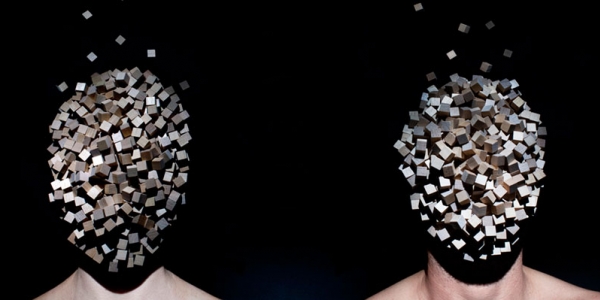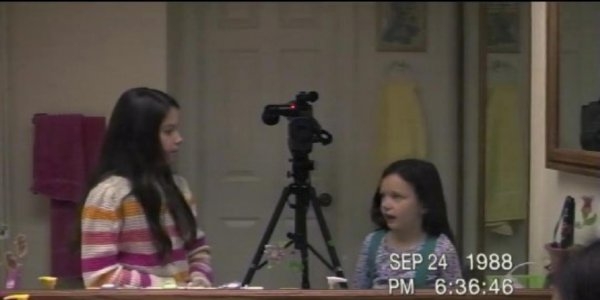Perry’s Double Think is more a running dialogue between opposites, which carries through all aspects of the show’s aesthetic. Lighting fluctuates between extremes of pitch-blackness and unforgiving glare, between a thunderous electronic soundscape and the soft patter of the dancers’ footsteps. This dualism is even reflected in the casting of the performers, a short woman (Kirstie McCracken) and a tall man (Lee Serle), whose movements oscillate between synchronisation and contradiction.
In a set that resembles a 3D wooden jigsaw puzzle, the duo manipulate the staging as they dance, casting strange geometries of light and shadow across the stage. At one point, the blocks are stacked into an asymmetrical wall that the performers manoeuvre from behind, animating these rectangular prisms with magical movements. The couple then emerge from gaps within this structure, only their arms and shoulders protruding to make their jerky, rhythmic gestures appear as part of the wooden set.
It is Benjamin Cisterne’s lighting design that coheres the show’s disparate parts. With half the illumination housed within the stage, the performers also manipulate the lighting as they move. Like cinema, it create close ups and cuts, rendering the stage magical before dismantling this magic just as quickly. After particularly wondrous sequences, the house lights will go up to reveal what is essentially an empty stage filled with plywood boxes. These chiaroscuro extremes play games with the audience’s perception, as you struggle to decipher if the dancers’ impossible movements are real or just a trick of the theatre.
The dancers too deconstruct the magic of their performance. In one section, they throw each other increasingly more farcical cues, like “bad bruising”, “dogs’ noses” or “the part of the egg that’s not the yolk”, poking fun at the potentially esoteric language of contemporary dance and revealing their spellbinding gestures as absurd.
In its conclusion, however, there is something about Double Think that feels slightly unformed. While Orwell’s concept holds much potential, it is not fully realised here. I found the show wholly captivating, but with the performance running at only 45 minutes, its sudden ending felt like Perry was not exploring just two thoughts but rather a jumbled multitude. Or perhaps it was just the fact that I desperately wanted more.
Double Think was presented at Arts House, North Melbourne Town Hall as part of the Melbourne Festival. Season has ended.







